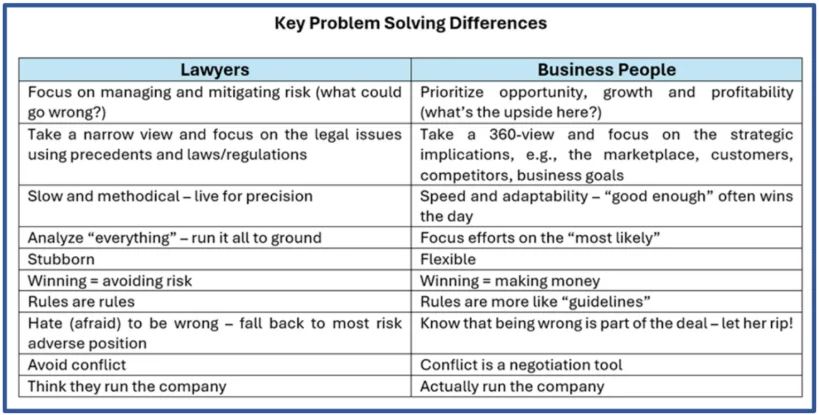Move from legal advisor to trusted business partner with these executive engagement strategies
Highlights
- Success as in-house counsel requires a fundamental mindset shift from a law firm's issue-spotting approach to that of an integrated business partner who deeply understands the company's goals, operations, and risk tolerance.
- Build credibility with executives by embracing calculated risks, providing fast and practical solutions instead of theoretical legal analysis, and focusing on actionable guidance that aligns with strategic business objectives.
- Effective communication involves abandoning legal jargon for clear, direct language, using active listening and strategic questions to understand core business needs, and delivering the bottom-line answer upfront to build trust and facilitate quick decision-making.
Jump to ↓
In-house is different from law firm
Navigating daily executive interactions as in-house counsel
Shift your thinking on how to solve problems
Build your credibility with the executive team
Learn to listen and ask a lot of questions
In-house is different from law firm
Let’s start with the basics and discuss why working in-house is different than working at a law firm.
First, you are integrated into the business and expected to bring a deep understanding of the company’s goals, operations, culture, and risk tolerance to the table in addition to your legal skills. You are a business professional with a law degree while most outside counsel are hired to help solve a specific legal problem until the next time they’re needed. As an in-house lawyer, next time is always right now.
Second, in-house counsel often play an important role in decision-making. This position requires you to make judgment calls about acceptable risks and how best to support the company’s overall business and strategic objectives. This is due to your understanding of the business operations and the risk tolerance of its executives.
Here are some additional differences or areas of emphasis. Successful in-house lawyers:
- Feel a sense of ownership over the outcomes of legal decision — they are responsible for more than just providing legal advice.
- Translate complex legal issues into something the business can understand — they do not talk and write like lawyers.
- Operate with a high tolerance for risk and uncertainty — the good ones thrive on it.
- Provide guidance and recommendations on the best course of action for the business.
- Offer context and background on issues to help executives in determining the most effective business strategy, which may not always be the best legal strategy.
- Are hyper-focused on the most practical and simplest solutions.
- Move fast and are not afraid of being wrong.
- Focus on what is important and relay the “bottom-line” to the business leaders.
Some of these are discussed in more detail below.

2025 State of the Corporate Law Department
General counsel seek to redefine value and enable organizational success
Increase your value ↗
Navigating daily executive interactions as in-house counsel
There is one other big difference: interacting daily with busy business executives. When you are outside counsel, your meetings with executives of the client are generally infrequent and usually scheduled well in advance. In the in-house world, your meetings and interactions with executives are daily, often with little warning and usually with some sense of urgency. This is when you start learning some of the most important lessons of being in-house counsel.
To start, most business executives have a low comfort level for legal issues and may not understand the relevance to themselves or the company. Your job is to cover the basics of the problem as well as the solution. This gives an understanding of the issue instead of solely providing advice on next steps. Next, and no surprise, speed is a priority. You do not have the luxury of taking days, let alone hours to research issues — executives want a quick turn around and you have to adjust to that pace.
Furthermore, lawyers tend to be risk adverse in most things. Business executives? Not so much. Embracing risks is part of the job, routinely making high-stakes decisions involving significant financial commitments. They do not want their in-house lawyers to be any less comfortable with analyzing risk and expect to collaboratively navigate uncertain areas. This aspect of the job makes many lawyers new to the in-house world very uncomfortable. Similarly, executives want practical answers — answers that show you understand the business and the world in which the business operates. In short, “law school exam” answers do not go over well, mostly because they are based more in theory than reality.
Lastly, executives want solutions and not just a list of all of the problems you can spot. This means focusing more on what needs to be done instead of a legal analysis of the problem. For many in-house lawyers, this is difficult given their training in spotting issues and applying the law to those issues. A successful in-house lawyer does that, of course, but does not bog down the business with the nitty gritty of the law. Instead, they focus more on discussing next steps. This requires thinking and acting like a business partner who wants to get to yes, and not a lawyer who looks for ways to say no.
Shift your thinking on how to solve problems
There are distinct differences between lawyers and business professionals. Below is a chart comparing traditional problem solving approaches of lawyers with those of business executives. To be successful, you will ultimately need to shift your thinking toward the right side of the chart.

Sure, these are generalizations, but they are generalizations based in reality. The most challenging aspect is viewing is rules as “guidelines.” Business leaders can easily look for shortcuts when times get tough or there is pressure to deliver certain results.
In-house lawyers, while serving as the company’s guardians, must have some flexibility and assertiveness when decisions are borderline but not explicitly unethical. Mastering this balance between ethical obligations and business demands is crucial for success in this role.
Build your credibility with the executive team
While most lawyers are respected by business executives, the key is credibility — the executives trust you and the advice you are giving. You do this by showing them that you understand how the business really works and that you are keeping this top of mind as you analyze problems. Here are the basics:
- Know the company’s corporate and organizational structure.
- Know “who’s who” and how decisions get made.
- Who is/are the decider(s)?
- Who decides what options go in front of the deciders?
- Know the company’s products and services — get a demo.
- Know the company’s key customers, competitors, and vendors, and what they do.
- Know what is in the company’s strategy documents, business plans, goals, etc.
- Meet with executives frequently to understand their perspectives and priorities. Explore how you can support their goals or when it’s best to step back.
Learn to listen and ask a lot of questions
Trusted advisors listen at least as much as they talk because solving problems requires you to truly understand what the executive wants. You do this by sharpening your active listening skills.
Active listening means fully focusing on, understanding, and responding thoughtfully to the speaker, and using verbal and nonverbal cues. It entails giving undivided attention, withholding judgment, and reflecting on what is heard to ensure understanding. This prevents miscommunication and missteps, builds trust and credibility, and, most importantly, allows you to align your advice with business objectives.
Active listening as an in-house lawyer requires asking the right questions so you can get to the core of the problem quickly. Here is a checklist of questions to ask to help with the task:
- What are the root causes?
- Why do we want to do/stop this?
- Who needs to be included to help figure this out?
- Who needs to be part of the team to solve this?
- Who cares about this problem?
- What are the business, people, and legal implications if the problem is not addressed?
- What is fact and what is opinion?
- What constraints or limitations must be considered?
- What does a successful outcome look like?
- Who wins and who loses?
- Who is the decision maker?
- What has been tried before, and did it work?
- Why did it work or fail?
Be practical and embrace risk
Being practical can help you quickly gain the trust of the executive team. Most business executives expect their in-house legal team to deliver complicated answers full of caveats and little actionable guidance. Unfortunately, they are not wrong. Many in-house lawyers, especially those new to the role, continue to act like outside counsel. They provide overly complicated answers, hedge their bets, and are fearful of being wrong. Or, as someone once explained it, “Outside lawyers like to play chess when they should be playing checkers.”
In the in-house world, focus on providing straight-forward and practical advice — play checkers when you can and chess only when you must. This means giving advice that makes sense, considering all of the business and legal factors at play, and offering solutions that work in the real world.
It also means not unnecessarily slowing down the business by failing to understand and align with the company’s risk tolerance. Businesses that do not take risks usually fail. That is why business executives constantly take risks. They want lawyers who help them analyze risk — not just shun it. Learn to embrace risk and your relationship with the business will dramatically improve.
Stop writing like a lawyer
Most importantly, stop writing and talking like a lawyer. You are a business professional with a legal degree — write and speak like a business professional. Writing for executives is very different than writing for a partner at a law firm or a court because business leaders:
- Have limited attention spans and experience with legal matters.
- Prioritize speed, seeking quick solutions rather than exhaustive analysis of every detail.
- Need you to get to the bottom-line, both with your writing and during meetings:
- Always consider the business context.
- Prioritize conveying information, not legal details.
- Solutions over risk!
- Summarize the answer upfront.
You must forget most of what you learned in law school or at the law firm about writing. No one wants footnotes, case citations, perfect “Blue Book” form, or hearing about dicta and dissenting opinions. They just want answers. Give it to them – right up front.
Do not force your reader to wade through ten pages of legal analysis to get to your answer. Give the best answer you can with what you have. Could you be wrong? Absolutely. Just like every business executive from the first used dinosaur salesman to the future personal hovercraft company CEO. It’s called being part of the business.
Dealing with business executives is challenging, even for the most experienced in-house lawyers. Changing your mindset to that of business professional with a law degree is the first step. Learning business is critical. From there, it is all about being practical, understanding and adapting to risk tolerance, and communicating in ways that business executives understand.
The more you do these things, the better your relationship with the business team. If you have access to Practical Law and Thomson Reuters AI tools, you have the resources at hand to help you succeed as in-house counsel.

AI news and insights
Industry-leading insights, updates, and all things AI @ Thomson Reuters
Join community ↗








